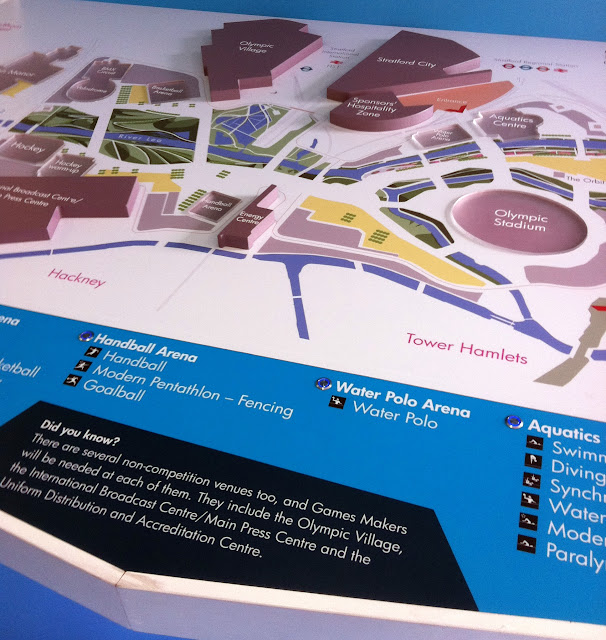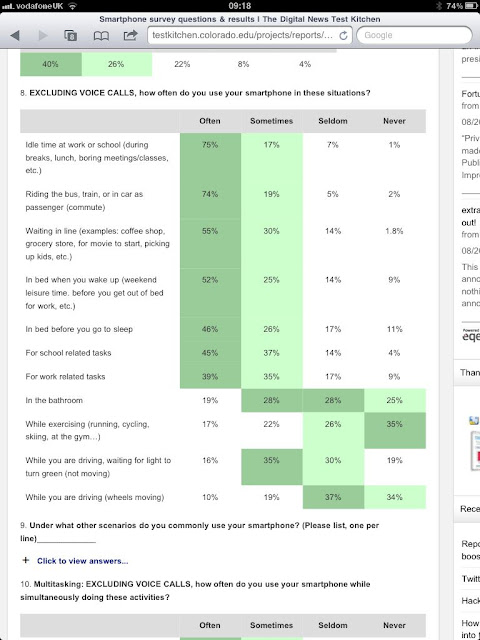
Fig. 1. Display of the Olympic Village, ExCel, Custom House, London Docklands. Part of a display for the 3,500 Gamesmakers who are being recruited over the next months to support the Olympics next summer.
Not blogging is for me a loss as I have always used a diary (1974-1999) and then a blog (1999-to present day) to provide a record or archive of what is hitting my head every day.
This provides, during times of reflection, the opportunity to think over events. (With a diary I might not look back at a page for a decade, but at least it was there).
I have little doubt that this is because I am between modules. Creativity, Innovation and Change (B822) kicks off in November.
Many colleagues keep a 'daily log or notebook'. I used to, but found I'd fill them too quickly. I favour IT to assist, sort, store. I will 'forget about' something in the knowledge that I can draw it from my electronic 'brain'; this of course assume that the content has made it that far. So a blog is a repository. The problem is which blog? These have a habit of splitting into multiple folders.
Nor is this blog the place for Social Media and Online Communications (my role at the Open University Business and Law School). Though at times there is considerable overlap with all that I have learnt in the Masters in Open and Distance Education. (Modules H800, H809 and H807 completed).
Nor is it the place for my potential adventures with the London Olympics 2012, which had me (like a number of OU Colleagues) attending a 'Gamesmaker' presentation and interview yesterday. I have been lined up for the Press Office, potentially to contribute to the Knowledge & Information desk which will draw in educational value from the events to share with future Olympics, otherwise either in the Olympic Village editing/writing a regular newsletter, or at one of the venues 'door-stepping' athletes and getting their words to the media centre.
My summer 'vacation' 2012
A part solution to the failure to post a blog is:
1) I took notes (directly into an iPad for the most part, so no need to transfer/transcribe)
2) I took pictures (sometimes with the iPad, now with an iPhone, such grabs of presentation slides that I immediately upload to Picasa Web. These in turn would be best placed in a photo friendly blog in WordPress, FlickR or Tumblr, though currently they are saved into locked galleries online).
3) I keep a daily log/notes of my day, aggregating content of interest from RSS Feeds (LinkedIn groups and Blogs) as well as Google Alerts. This has always remained offline. I need to get it into FileMaker Pro so that is it more searchable.
The above to provide a catalyst for developing further any one of these topics at a later date (if at all), but usually easy enough to discover if blogged (private view), or put into a relational database software package such as FileMaker Pro.
I therefore have a record of events, meetings, presentations and so on, which include:
MONDAY PR and the words of students and alumni from discussions and requests to our growing groups in LinkedIn.
TUESDAY Interviews with Alumni (three of the 1996 graduation group reflecting on their experiences of the MBA and what they have done since). Brief a TV production company.
TUESDAY Creation of a blog for Open University Business Network. Kathryn Tickell at the Stables (or was that last week ?!)
WEDNESDAY Using Camtasia, Audacity, a MAC and the Institute of Educational Technology 'Podcasting Suit' to produce a video-version (animation/movie) of a presentation I gave on Social Media in Higher Education which I wish to induct academics (or their teams) to use to compress 45 minutes lectures into scripted pieces that are more 'Web Friendly'.
WEDNESDAY Tweet inaugrual lecture of Professor Cherie Booth and the acceptance speech of Leslee Griffiths BA.
THURSDAY Personas and Mental Mapping (an OU technique to understanding and predicting visitor behaviours when using online materials)
THURSDAY Communications, Leadership and Influence (a presentation by the new Director of Communications). I took from this the need to make the time and effort to empathise with colleagues with whom I work.
THURSDAY Open University Businesss Network (a series of quarterly breaksfast briefings for local business people that started on Thursday)
THURSDAY Edit of interview visiting fellow from Ghana

